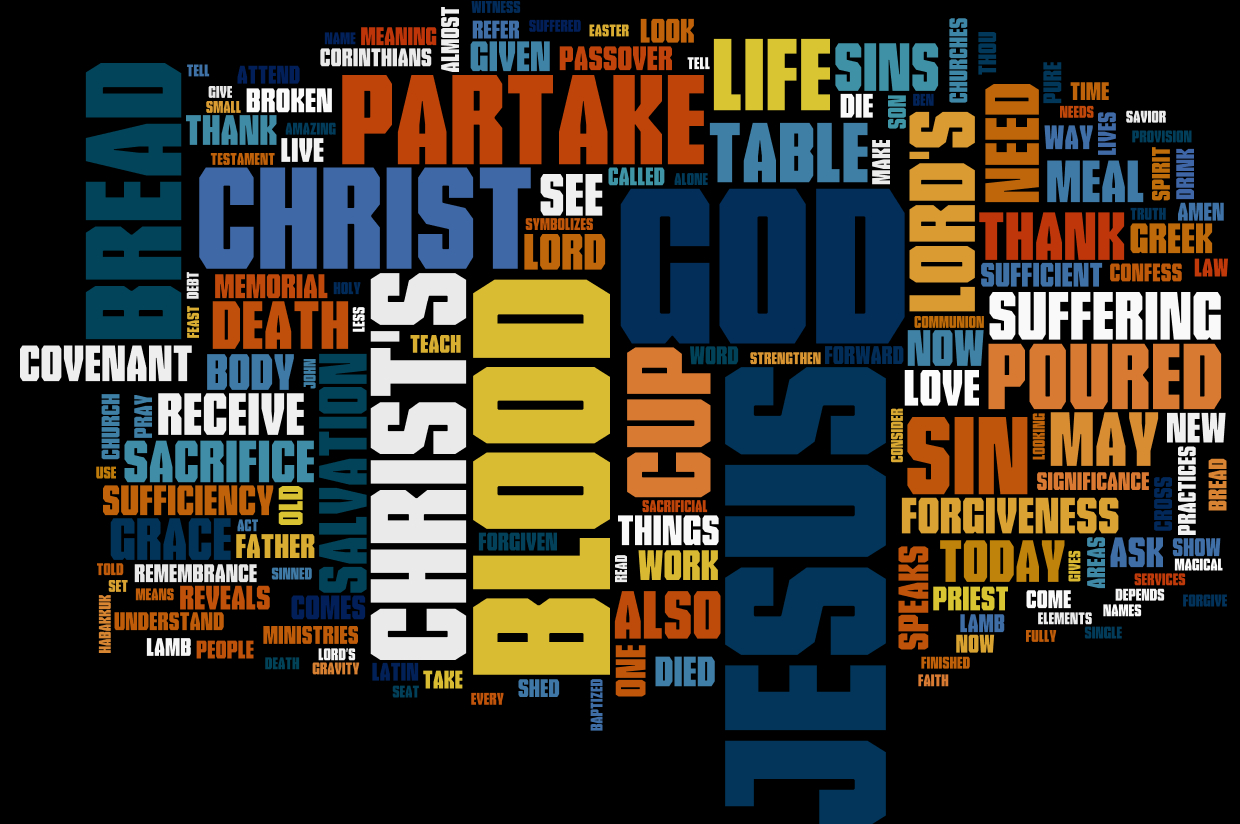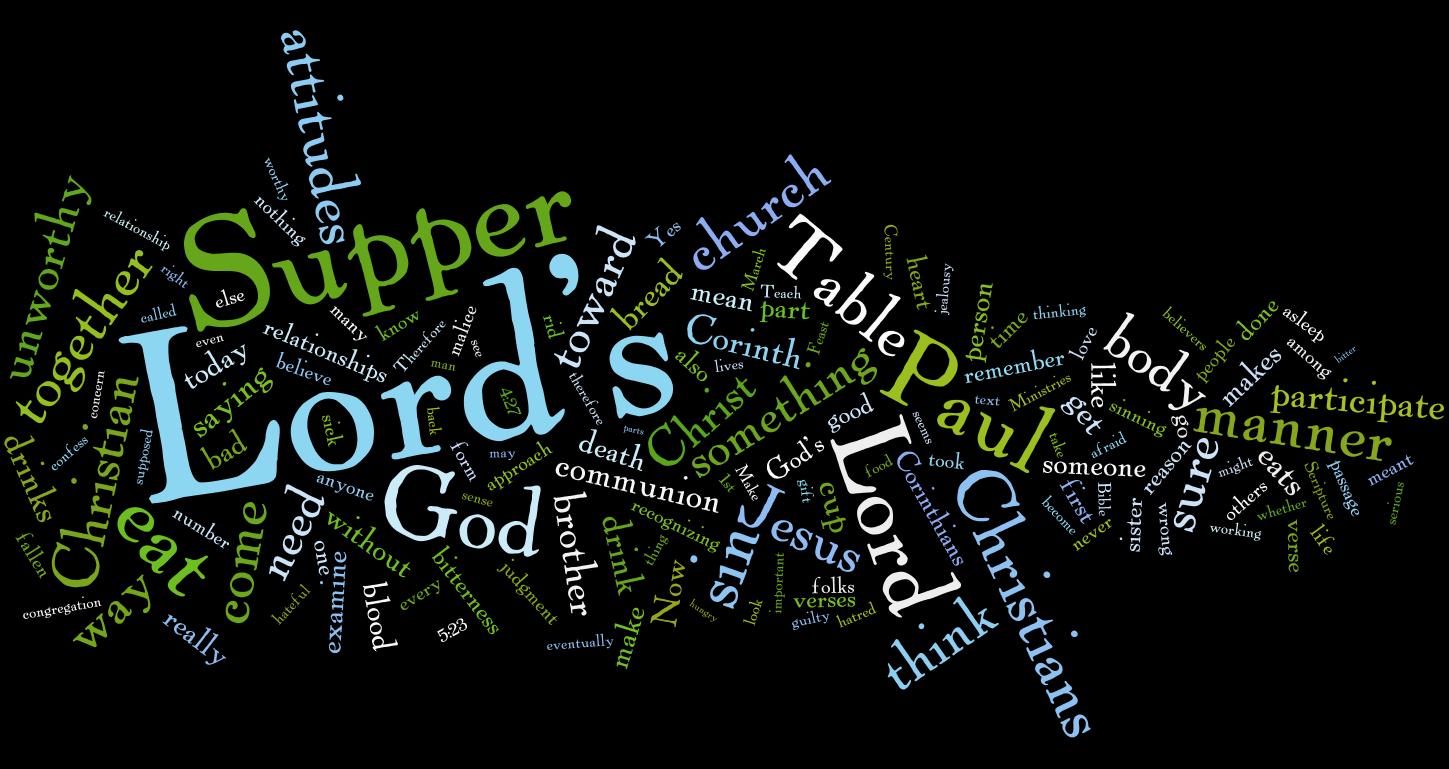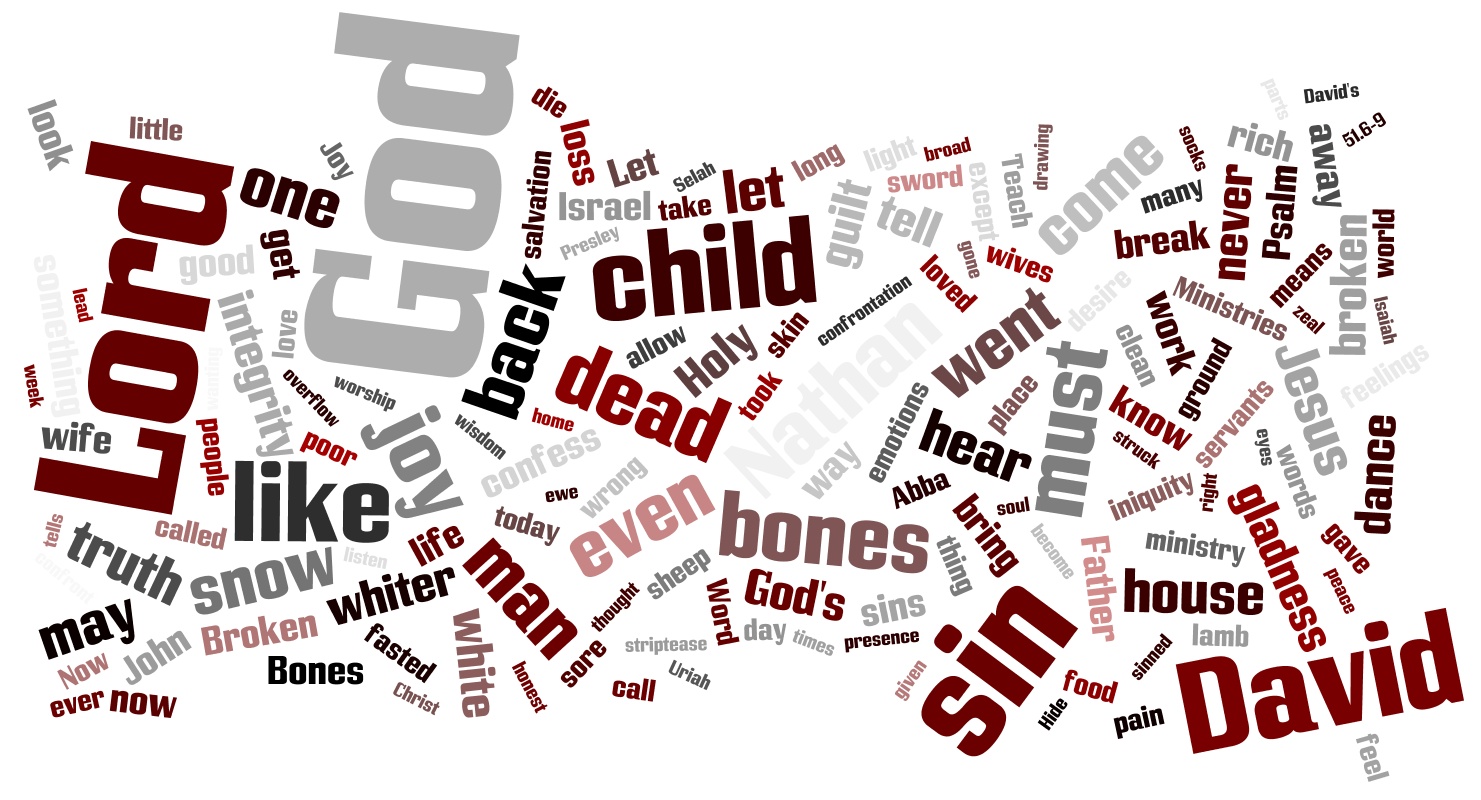| Communion-The Lord’s Table | ||
| March 07, 2004 | Sermon by DRW | Passage 1 Corinthians 11.23-26 and John 13 |
For I received from the Lord that which I also delivered to you, that the Lord Jesus in the night in which He was betrayed took bread; and when He had given thanks, He broke it, and said, “This is My body, which is for you; do this in remembrance of Me.” For as often as you eat this bread and drink the cup, you proclaim the Lord’s death until He comes. (1 Corinthians 11:23-26)
If you were to attend all of the Good Friday and Easter Sunday services in all of the churches in this area and witness the celebration of our Savior’s sacrifice, you would probably be surprised at the variety of practices, beliefs, and names associated with the service.
You may attend one church where people gather in an informal meeting and practice an earnest exhortation and self-examination before they ate of the bread and drank of the cup. They may use a single loaf and single cup, or they may use small pieces of bread and small individual cups. The people may come forward to an altar where they receive the bread and the cup, or they may have it brought to them in the seats.
You may attend another church where you would witness a priest with attendants dressed in colorful vestments. The priest alone would drink from the chalice of wine and the people would receive only the little white wafers. After the priest utters the words of consecration, “This is My body” — hoc est corpus meum in Latin, the elements are believed to actually become the flesh and blood of Jesus.
No doubt you would find many other practices as well. And you would also find many names by which these services are designated. Some, from a Greek tradition would refer to it as a “mystery,” from the Greek word mysterion. Other Christians with a Latin background may call it the “mass.” This is taken from the words of dismissal (missa = mass) which are used by the priest. You may also hear it referred to as a “sacrament,” which comes from sacramentum, a Latin word meaning “pledge of allegiance” which itself is a translation of the Greek word mysterion. Congregations influenced by the Protestant Reformation of the 16th Century usually call the service the Lord’s Supper, or Lord’s Table. Some refer to it as the Eucharist, from the Greek eucharistia which means thanksgiving. Others refer to it as Communion, from the Greek koinonia which means fellowship or communion. As you can see, practices and beliefs vary.
Some attach an almost magical significance to the Lord’s Table. There are those who believe it is in itself a grace imparting act. Some churches teach that partaking in this meal is a literal receiving of Christ’s body and blood and guarantees salvation. To them, it is essential.
On the other hand, there are others who ascribe almost no significance to this memorial meal. While they rightly reject the mistaken positions of those churches which make the meal more than it is, they, in doing so to such an extreme, make it less than it is. To some, this memorial meal is not as significant as it should be.
From the Bible, we understand that the Lord’s Table is not a magical rite which itself imparts grace, but neither is it simply a nice ceremony filled with nostalgic memories. Rather, it is an ordinance of the church, which, if properly understood can bring us into the presence of God, help us deal with our sin, restore fellowship with God and one another, give testimony of the significance of Christ’s sacrificial death, and point to the Second Coming of our Lord.
I would like for us to look at Easter by looking at the Lord’s Table today. By way of reminder, the last meal that Jesus had with His disciples in the Upper Room had as part of it this ordinance we are looking at today. We will examine the meaning of communion through an understanding of the two elements we partake, the bread and the cup.
1. Christ’s Body Broken
In this memorial meal, we partake first of the bread. The bread is symbolic of Christ’s body broken for us.
When we behold the bread, we see a dual truth. The bread speaks to us both of Christ’s suffering and His sufficiency. He is both the Savior who suffered for us and who Himself is sufficient to meet our every need.
When you think of and hold the bread, see Christ’s suffering. This, of course, is a central message of this memorial meal. The Lord’s Table speaks to us of the death of Christ. It was a painful death. It was a death full of the suffering which paid for our sins.
[show clip of Passion?]
What does that suffering reveal?
a. For one thing, it reveals the gravity of sin.
God must consider sin to be so serious if Jesus had to die for God to forgive sin? The fact that Jesus had to die for our sins to be forgiven indicates that God hates sin. The psalmist says as much. In Psalm 5:5 we read, “Thou dost hate all who do iniquity.” The prophet Habakkuk says of God in Habakkuk 1:13, “Thine eyes are too pure to approve evil, and Thou canst not look on wickedness with favor.” Our God is a holy God. He is too pure to condone sin. Indeed, He hates sin because sin destroys His work. But more than that, sin is a moral plight which nothing less than the suffering of Christ could cure. The sacrifice of Christ speaks loudly of the gravity of our sin.
Have you thanked Him? Let’s take time to do that right now.
Father, thank you for Jesus. Thank You for forgiveness. Thank You for making us stand pure before You through Jesus. Bring to our minds, Father, those areas of our lives that we are consistently sinning in. We pray Your Holy Spirit show us these things. In Jesus name, Amen.
b. But the suffering of Christ also reveals the love of God.
We are all familiar with the passage in John 3:16 which reads, “For God so loved the world, that He gave His only begotten Son, that whoever believes in Him should not perish, but have eternal life.” It was because of the love of God that Jesus suffered and died on the Cross. This is why He came. This is why He died. Charles Wesley expressed it this way:
Amazing love! How can it be
That Thou, my God shouldst die for me?
We sing of amazing grace — we should also sing of amazing love! When Jesus died on that Cross, it was the greatest expression of God’s love that could ever be given.
[see if the music set has a song that would fit here; if so, have them play it here instead of in the order given]
c. Finally, His suffering reveals the provision of God. It reveals that Christ’s death is sufficient for our every need.
Romans 8:32 says,
“He who did not spare His own Son, but delivered Him up for us all, how will He not also with Him freely give us all things?”
The God who gave Jesus for us will not withhold anything that we need.
When Jesus allowed His body to be broken, He was doing so for our sake. We are told in Isaiah 53:5,
“But He was pierced through for our transgressions, He was crushed for our iniquities; the chastening for our well-being fell upon Him, and by His scourging we are healed.”
Because Christ’s body was broken for us, we can now experience the provision of God. Our needs can be met through the Lord Jesus. Paul tells us in Philippians 4.13:
I can do all things through Christ who gives me strength.
So, today as you partake of this broken bread, understand that it symbolizes both the suffering and the sufficiency of Christ. Do you need His sufficiency? Do you need more than you can provide for yourself? Jesus is what you need. He called Himself “the Bread of Life.” He is the Living Bread which meets the deepest needs of our spiritual hunger. Feed upon Him. Feast upon His sufficiency. Don’t partake today if you do not need His sufficiency. But if you do, then in sweet surrender to Him, partake of this bread, and by faith receive the Living Bread.
If you have been baptized, we ask you to please come forward, take a portion of the bread, return to your seat. Before we partake of the bread, consider the areas of your life where you have sinned, failed God. Confess those before we partake. I am going to lead us in a prayer. When I am finished, I ask Ben to pray over the bread.
Father, we have asked Your Holy Spirit to show us those areas where we have sinned. We ask that You now forgive us of those sins and strengthen us not to do them again. Confess your sin before God today. Tell Him, that you have [tell Him your sin] and that you need Him to strengthen you to overcome it. Thank Him for forgiveness and restoration. Thank You for the work You have done in our lives and the work You are doing now. In Jesus name, Amen.
Ben prays
Let us partake in remembrance of Him.
2. Christ’s Blood Poured Out
The second element of the Lord’s Table of which we partake is the cup. The cup is filled with the fruit of the vine which symbolizes the blood of Christ. The blood itself is symbolic of life. So when we speak of Christ’s blood poured out, we are speaking of His life being poured out. And when His life was poured out, it was poured out as a payment for our sins.
We see the truth of this in Leviticus 17:11,
“For the life of the flesh is in the blood, and I have given it to you on the altar to make atonement for your souls; for it is the blood by reason of the life that makes atonement.”
A life had to be given, blood had to be shed for there to be forgiveness.
What we see in the Old Testament, we also see in the New. In Hebrews 9:22 we read,
“And according the Law, one may almost say, all things are cleansed with blood, and without shedding of blood there is no forgiveness.”
This is why a sacrifice for the forgiveness of sins had to be made. In the Old Testament it was the sacrifice of an animal. But this was not sufficient. What was needed was not the sacrifice of a lamb, but the sacrifice of the Lamb of God.
Jesus is the Lamb of God! It was at the celebration of the feast of Passover when Jesus instituted this Lord’s Table. The Passover feast commemorated the time when God spared Israel from the Angel of Death during their captivity in Egypt. A lamb was slain and the blood was placed on the doorposts and lintel of each house. When the Angel of Death saw the blood, he passed over each house.
Jesus is called “Our Passover” in 1 Corinthians 5:7. Christ, the Lamb of God, has been sacrificed as our Passover. His blood was shed for us.
a. Christ’s blood poured out speaks of the forgiveness for sins.
Because of His shed blood, we can now be fully and freely forgiven by God. 1 Peter 1:18-19 says,
“. . . you were not redeemed with perishable things like silver or gold from your futile way of life inherited from your forefathers, but with precious blood, as of a lamb unblemished and spotless, the blood of Christ.”
b. Christ’s blood poured out speaks also of a New Covenant of grace.
The Old Covenant was not sufficient for salvation. To be saved under the Old Covenant, we had to keep the Law perfectly. We could not err in any one point. Our righteousness had to be absolutely flawless. But that was our problem, we could not keep the Law.
Now, under this New Covenant of grace, our salvation does not depend upon our works. Our salvation depends upon Another’s work. It depends upon the finished work of Jesus Christ. He did what we could not do. He died so that we would not have to die. He paid the penalty for our sins by His blood poured out on Calvary’s Cross. Now we can enter into a New Covenant with God, based not upon our own works, but based upon His grace offered to us because of the sacrifice of Jesus.
In this New Covenant, we now live for Christ by letting Christ live in us. It is what some have called “the exchanged life.” When we receive Jesus, He gives us His life in exchange for ours. Now we live on the basis of His life being lived in and through us. This is what salvation is all about.
We are saved through Christ’s blood poured out. We are forgiven through Christ’s blood poured out. We are kept through Christ’s blood poured out. So, when you partake of the cup today, understand that Christ’s blood poured out has purchased your salvation. If you do not need His salvation today, do not partake. Unless you are willing to trust Christ alone for your salvation, do not partake. But if you are, then receive the cup with gladness! When you receive the cup, by faith drink deeply of His Spirit as well. By an act of surrender, commit yourself fully to Christ. Confess your sins to Him. Receive His grace.
If you have been baptized, we ask you to please come forward, take a cup, return to your seat. Before we partake of the cup, thank Him for paying a debt He did not owe because we owed a debt we could not pay.
Tell Jesus out loud, “Thank You, Jesus!” Let’s say that together. “Thank You, Jesus!”
I ask Mike to pray over the cup.
Let’s tell Him again: “Thank You, Jesus!”
Let’s us partake of the cup.
The Lord’s Table is rich in meaning. It pictures for us the sacrificial death of our Lord and Savior Jesus Christ. We are told to do it in remembrance of Christ. As we partake, we “proclaim the Lord’s death until He comes.” The Lord’s Table is not only a look back, it is a look ahead. The same Lord who died to save us is coming again to receive us to Himself. Until He comes, let’s commit ourselves to live for Him.
Father, thank You for commanding us to set aside time to remember what Your Son, Jesus Christ, did for us on the cross. Thank You for freeing us from the power of sin, thank You for changing our lives, and thank You for what You have promised to those who love You. Amen.
©2012 Teach for God Ministries. Used by Permission.
Permissions: You are permitted and encouraged to reproduce and distribute this material in any format provided that you do not alter the wording in any way and do not charge a fee beyond the cost of reproduction. For web posting, a link to this document on our website is preferred. Any exceptions to the above must be approved by Teach for God Ministries.
Please include the following statement on any distributed copy: By David R Williamson. ©2012 Teach for God Ministries. Website: www.teach4god.com




